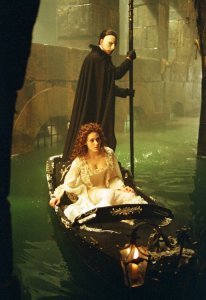The Phantom of the Opera
The World’s Biggest Musical!

|
After much speculation, Andrew Lloyd Webber’s greatest musical success finally makes its way to the big screen. The Phantom of the Opera tells the tale of a facially disfigured musical genius (Gerard Butler), terrorising the Paris Opera House and of the young chorus-girl, Christine (Emmy Rossum), whom he teaches and falls in love with. The tale, adapted from Webber’s famous musical is in turn based on the 19th Century French novel by Gaston Leroux.
Schumacher; the creator of Lost Boys, Batman and Robin and Flatliners; relishes in the Gothic excesses of the tale, and fans of the book and stage versions will not be disappointed. Here we have all the major topes: dripping candles, blood-stained wedding dresses, and, of course, enough dry ice to suffocate a small city. The film also features some noticeable appearances by Miranda Richardson whilst Simon Callow and Minnie Driver add some much needed comic relief in their roles as Andre, the beleaguered Opera-House manager and Carlotta, the prima-donna of his nightmares.
Whilst retaining the musical’s most memorable show-stopping tunes, the film version does suffer in its translation in some ways, often seeming like Moulin Rouge without the tongue-in-cheek. However, the overall quality is enough to suspend the incredulity and sustain the interest of the audience. Occasionally, the elements of film and musical sit uneasily together, particularly in those awkward moments of transition between normal dialogue and song. When, however, the musical sequences get off the ground, the film is at its strongest, and both Schumacher and his performers pull out all the stops to exploit Webber’s sumptuous melodies to their full emotional potential.
As with Webber’s stage creation, the film’s aesthetics have clearly been carefully formed if not perhaps a little over-laboured, for instance in the use of black-and-white in the flash-forward sequences and the continually reappearing visual motifs (angels and roses etc.). The film holds enough of the original darkness to make it a creditable exploration of some of the more shadowy aspects of human psychology, and The Phantom of the Opera, like all great gothic fictions, does this by pushing its characters and situations to their extremes.
Ben Chisnall
More Information | Back to Previous Schedule | This Season | BBFC Classification Guidelines
Screenings of this film:
| 2004/2005 Summer Term – (35mm) |


